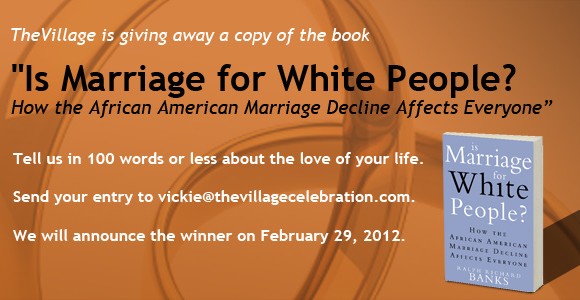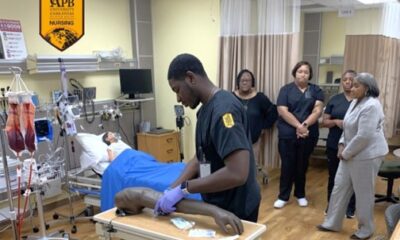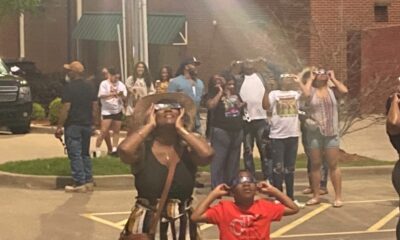Culture
Is Marriage for White People?

Each February Americans profess their love with cards, flowers, and proposals. But, who is getting married? According to the 2010 Census, not very many African-Americans are tying the knot. A new book, “Is Marriage For White People” examines the numbers. TheVillage provides questions and answers from the author, Ralph Richard Banks.
Isn’t marriage declining among all groups in the United States? Yes. Americans are more unmarried now than at any time in our history. A central point of the book is that the marriage decline among African Americans is a more extreme expression of developments that affect all of society.
Are the marriage rates between African Americans and other groups really that different? Yes. While marriage has declined throughout society, the drop has been more precipitous for African Americans than for any other group. Black women are more than twice as likely as other groups of women to never marry. Black men too are less likely to be married than are men of other groups.
Is the racial gap in marriage primarily a result of the low level of marriage among the black poor? No. It is true that marriage has declined the most among poor people, and that the black poor are the most unmarried of all. But the racial gap in marriage is apparent even among the middle and upper middle class. College educated black women in their thirties, say, are twice as likely as their white counterparts to be unmarried. And college educated black men are less likely to be married than college educated men of other races.
How long has the racial gap in marriage existed? Through the early and middle decades of the 20th century, black women were about as likely to be married as white women, and on average married at a younger age than white women. Then in the second half of the century, black women began to marry later than whites, and less frequently. Marriage began to decline among all groups during the 1960s and 1970s, but the drop was more severe for African Americans than for any other group.
Does it matter whether people are married? Marriage is something that many people want in their lives. Marriage also provides a beneficial setting for the rearing of children.
But don’t lots of couples live together without getting married? Yes they do. Living together without being married is more common now than ever in American history. But it is still the case that most unmarried couples who live together have less committed relationships than those who choose to marry. Most couples who live together do so either as a prelude to marriage, to decide if they want to marry, or for reasons of convenience. Typically, these relationships either culminate in marriage or dissolve after a few years.
Aren’t marriage rates also low in many European countries? They are. In some European countries (for example, Sweden and France) marriage rates are much lower than they are in the United States. But in those countries there is less of a distinction between marital and non-marital relationships. Ironically, non-marital cohabitating relationships in some European countries are more stable than marriages in the United States.
Why do you think that black women should marry down less and marry out more? As the fortunes of African Americans have become more varied during the past several decades, black people have come to share less in common with eachother. College-educated black women will often have more in common with their Asian, Latino or white classmate than with the black guy they grew up with who did not go to college. Compatibility is crucial to the success of a marriage, and race is less central to compatibility than many people suppose.
Why should college-educated black women consider interracial marriage? Black women confront a numbers problem. Twice as many black women as men graduate from college each year. There simply aren’t enough college-educated black men for all the single college-educated black women. The educational gap between black men and women creates an economic gap as well. The job prospects for college graduates have improved during the past few decades, but the opportunities for less educated workers, men especially, have deteriorated. So if black women limit themselves to black men, most of them will either remain unmarried or wed to a less educated man who earns less than they do.
How did you go about writing this book? I read the scholarly literature for years, and then began interviewing people to try to understand how the findings of the research were reflected in people’s lives.
What was the biggest challenge in writing the book? I struggled not to censor myself, and to be able to speak truthfully about some very volatile issues. I had to get over my own anxiety about “airing dirty laundry.”
How are middle class black women responding to the book? Some black women love the book, and others hate it. Who is your audience? Anyone who is interested in the broad economic, legal and cultural forces that shape our intimate lives. What was the most surprising thing you learned in writing the book? That some black women don’t want to marry a white man because they are worried that a biracial child would look white.
For more information or to order the book, please visit us at http://ismarriageforwhitepeople.stanford.edu/

-

 Featured12 months ago
Featured12 months agoArkansas Sheriff Who Approved Netflix Series Says He Stayed ‘In His Lane’
-

 HBCUS12 months ago
HBCUS12 months agoSenator Boozman Delivers $15 Million to Construct New UAPB Nursing Building
-

 News12 months ago
News12 months agoMillions In the Path of The Total Solar Eclipse Witnessed Highly Anticipated Celestial Display
-

 Featured9 months ago
Featured9 months agoCalifornia Is the First State to Create A Public Alert for Missing Black Youth
-

 Featured9 months ago
Featured9 months agoAfrican American Leaders Stay the Course Amid Calls for President Biden To Bow Out of Race
-

 Featured9 months ago
Featured9 months agoThe Debate Fallout Lands on Both Candidates

